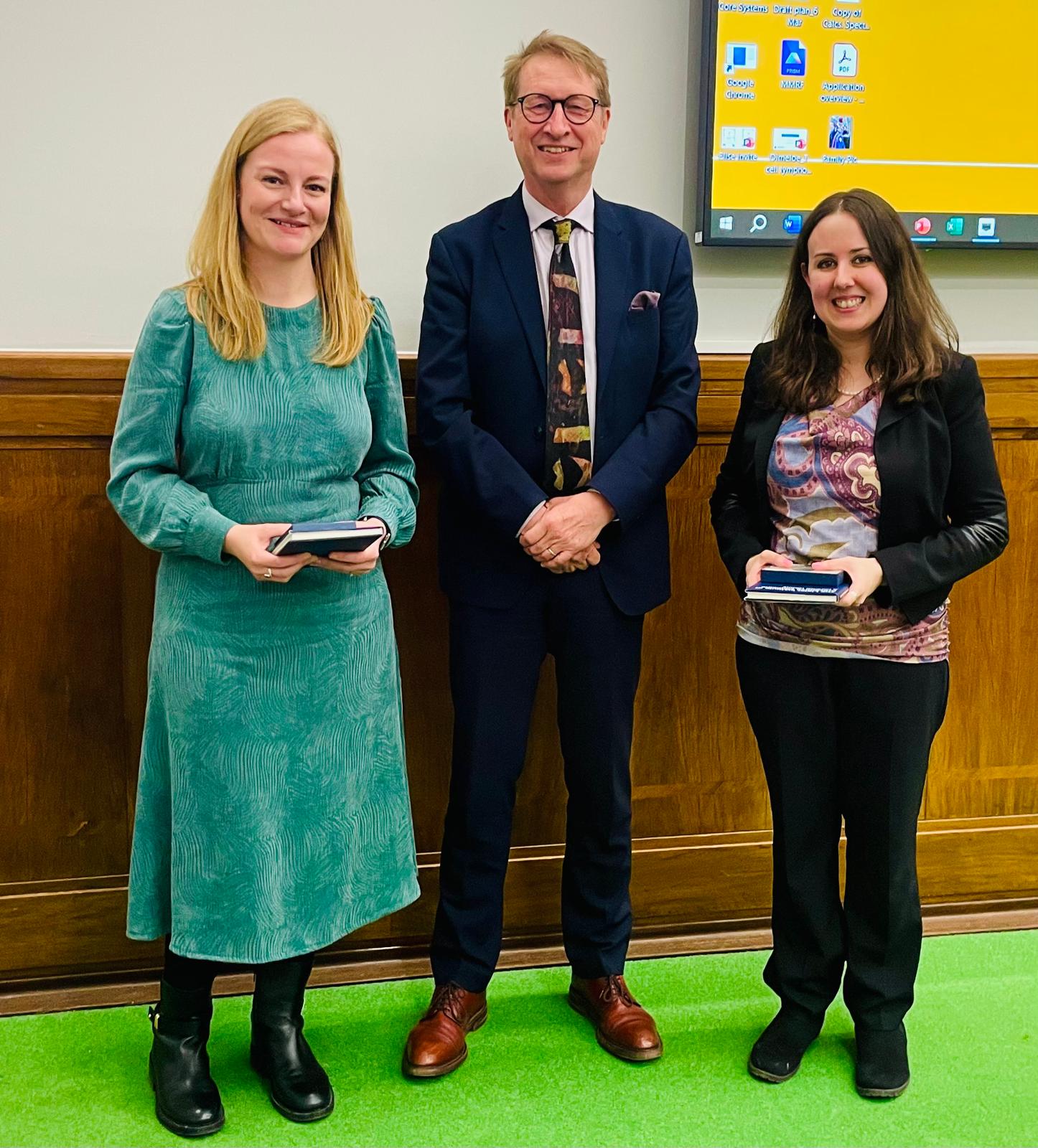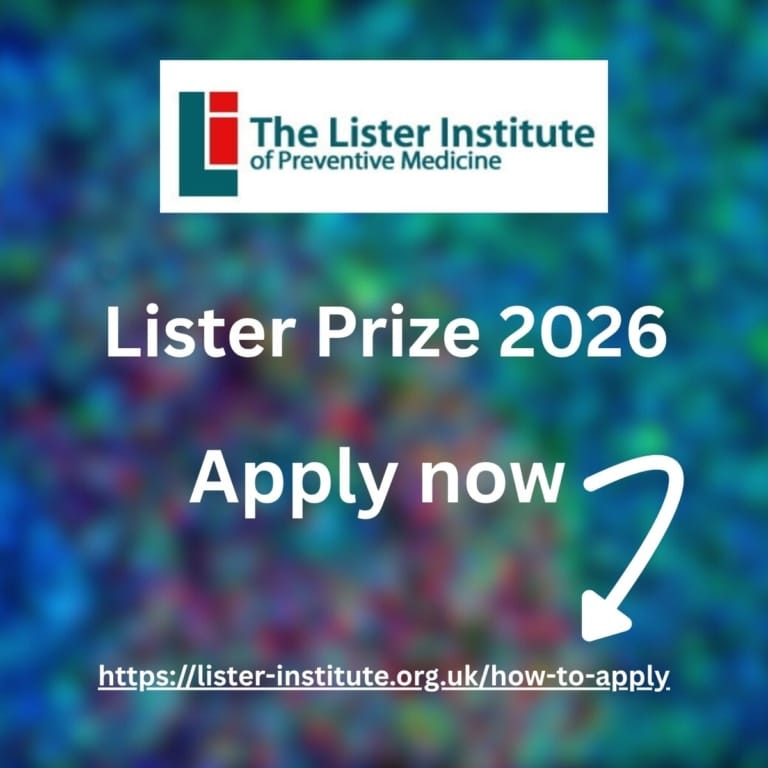The University of Birmingham is home base for a number of valued Lister Fellows and Former Fellows, the latest additions being our 2024 Prize winners Dr Sarah Dimeloe and Dr Rebecca Drummond. Following a successful Prize visit to the university to present them with their awards on 21st March, we celebrate the long-standing relationship between the Lister Institute and the University of Birmingham.

A hub of pioneering science
The University of Birmingham has a strong track record in biomedical sciences and preventive medicine, dedicating its resources and expertise towards innovations like cancer immunotherapies, which direct the immune system to target tumour cells, and diagnostic tools to improve disease identification and avoid unnecessary use of antibiotics.
It’s not surprising then that a long line of Lister Institute Members are connected to the university, comprising current and former Fellows with a broad range of backgrounds. Their specialisms range from DNA repair and immune cell signalling to understanding pathogenic organisms.
In addition to those currently based at the university, Birmingham has played an important role for many of our Fellows and Members who studied or carried out research there in the past. For Lister Fellow Tùng Lê for example, the University of Birmingham has an enduring significance.
“Birmingham means a lot to me. When I approached my undergraduate degree as an international student, Birmingham was the only place offering the full scholarship I needed. It was essential to my journey through undergrad and PhD and it has always been crucial to my career. I recall things I learned from tutors and lecturers at Birmingham and use them in my own work in the lab to this day. They gave me a wonderful education.”
– Professor Tùng Lê, Lister Fellow
Current and former Lister Fellows based at the University of Birmingham
- Dr David Bending (current Fellow) is an immunologist specialising in T cells. His research focuses on T cell response regulation and T cell receptor signalling.
- Professor Gurdyal S Besra leads a multidisciplinary team investigating the physiology of Mycobacterium tuberculosis, particularly its cell wall, to identify therapeutic targets.
- Dr Sarah Dimeloe (current Fellow) studies the metabolism of immune cells and how this relates to their role in health and diseases like cancer.
- Dr Rebecca Drummond (current Fellow) is a fungal immunologist. She researches the immune mechanisms that protect us from fungal pathogens, especially organ-specific responses.
- Professor Aga Gambus studies the regulation of DNA replication through small protein modifiers. She is also Director of the university’s Fellowship Academy, supporting early career researchers in their awards applications.
- Professor Prem Kumar specialises in chemoreception, studying specific mechanisms with a role in health and disease. He is a key member of the Birmingham Arterial Chemoreceptor and Hypoxia Group.
- Professor Robin May studies infectious diseases, with a special interest in how certain pathogens evade the immune response. He also serves as Chief Scientific Advisor to the Food Standards Agency.
- Professor Grant Stewart specialises in cancer genetics, looking at how failure of DNA repair mechanisms can contribute to diseases like cancer.
The College of Medicine and Health at the University of Birmingham is at the heart of the City’s Health and Life Science District, closely aligned with University Hospitals Birmingham, Birmingham Health Partners and the Birmingham Health Innovations Campus. Together, we deliver a comprehensive research portfolio that spans laboratory discovery science through to public health, implementation and translation to patient benefit through our world-leading clinical trials units.
The 2024 Lister Prize awardees are an important part of this community. Dr Sarah Dimeloe and Dr Rebecca Drummond, both fundamental immunologists, will use these awards to establish their leadership in their fields and elevate their research for national and global impact. We are passionate about supporting and developing our early career researchers and we are thrilled that both of these researchers have been successful in securing this prestigious award.
– Professor Jo Parish, Director of Research for the College of Medicine and Health
Supporting award applicants through positive collaboration
The University actively works to support its researchers in applying for awards such as the Lister Prize. The College of Medicine and Health has established a Fellowship Academy to offer tailored support for career-enhancing fellowships, led by former Lister Fellow Professor Aga Gambus. The service provides advice and guidance for the application process, as well as interview support and post-award mentorship.
The initiative reflects the university’s culture of positive collaboration, which emphasises the value of mutual support rather than competition among researchers. It offers researchers support in accessing not only the funding, but also the professional relationships and interdisciplinary insights fellowships like the Lister can provide. Researchers also benefit from tailored support from the Charitable Partnerships team who take a relationship approach to working with philanthropic funders.
The University of Birmingham is proud of its success with the Lister Prize over the years. Crucially, these awards are validation of how serious we are about supporting the next generation of researchers and cultivating talent. Award holders appreciate the flexibility of the Prize and the networking opportunities it opens up, and they have been generous in sharing their insights and demystifying what the Prize can unlock by encouraging potential applicants and taking an active role in writing and interview preparation.
In the most recent Lister Prize round, our researchers were successful in securing an unprecedented two awards, both working in fundamental and translational immunotherapy research. Drs Sarah Dimeloe and Rebecca Drummond took a collaborative approach to preparing their applications and subsequently shared mock interview panel clinics to offer constructive feedback to each other, rather than seeing it as a competition, and benefitted from advice from previous Fellow Dr David Bending.
– Professor Jo Parish, Director of Research for the College of Medicine and Health
Video (1:25): Sarah Dimeloe and Rebecca Drummond talk about their Lister Prize projects.
Applications for the 2026 Lister Prize will open in July 2025. Keep an eye on our website and social media channels for more details closer to the time.



